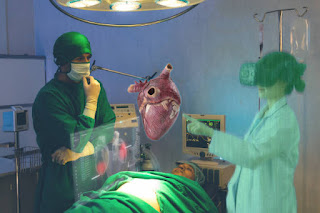Artificial Intelligence (AI) has been making waves in various fields, and healthcare is no exception. It has the potential to revolutionize the way healthcare is delivered, making it more efficient, accurate, and accessible. In this blog, we will explore how AI is impacting healthcare and what the future holds.
 |
| Artificial intelligence humobot |
#Introduction
AI has the potential to revolutionize healthcare by improving diagnosis, developing personalized treatment plans, accelerating drug discovery, enabling robotic surgery and automation, automating administrative tasks, remote monitoring, and improving the patient experience. While AI is not a replacement for human healthcare professionals, it can assist them in delivering more accurate, efficient, and personalized care. The future of healthcare looks promising, with AI at the forefront of innovation.
Improved Diagnosis:
One of the most significant impacts of AI in healthcare is improved diagnosis. AI-powered diagnostic tools can analyze vast amounts of patient data, including medical history, lab results, and imaging scans, to identify potential health risks and diseases accurately. This can lead to early detection and treatment, resulting in better health outcomes.
AI can also help in developing personalized treatment plans. By analyzing a patient’s medical data, including genetic information, AI algorithms can predict which treatments are likely to work best for a particular patient, based on their unique characteristics.
Developing new drugs can be a lengthy and expensive process. AI can help streamline this process by analyzing vast amounts of data to identify potential drug candidates more efficiently. This can potentially reduce the time and cost of drug discovery, leading to faster access to new and more effective treatments.
Robotics and Automation:
AI-powered robots and automation systems can assist healthcare professionals in performing complex surgeries and procedures. This can lead to more accurate surgeries with fewer complications and faster recovery times.
Virtual Assistants and Chatbots:
AI-powered virtual assistants can help healthcare professionals by automating administrative tasks, such as appointment scheduling and medical record keeping. This can free up time for healthcare professionals to focus on patient care.
AI-powered remote monitoring systems can track patients’ vital signs and health metrics in real-time, alerting healthcare professionals to potential health risks. This can help detect health issues early and prevent complications.
Improved Patient Experience:
AI can also improve the patient experience by providing personalized care and support. Chatbots and virtual assistants can answer patients’ questions and provide guidance, reducing the need for in-person visits. AI-powered devices can also monitor patients’ health at home, allowing them to stay in their homes longer and avoid hospital stays.
Precision Medicine:
AI is helping to advance precision medicine by analyzing patient data, such as genomics, medical history, and lifestyle factors, to identify personalized treatment options. This approach can lead to better patient outcomes and reduced healthcare costs.
Fraud Detection:
AI can help detect healthcare fraud analyzing large amounts of data to identify unusual patterns and transactions. This can help healthcare providers and insurers save billions of dollars in fraudulent claims.
#AI Revolutionizing Surgical Experience
Artificial intelligence (AI) has been revolutionizing various industries in recent years, and the healthcare industry is no exception. AI has been transforming the surgical experience, improving patient outcomes, and reducing costs. In this blog, we will explore the impact of AI on surgery and how it has revolutionized the surgical experience by adding situational scenes to each point.Prosthesis 3D printing:
3D printed surgical prostheses are being used to treat a wide range of conditions, from dental implants and hearing aids to joint replacements and even organ replacement. With its incredible potential to improve patient outcomes, it's no wonder that 3D printing is becoming an increasingly popular tool in the medical field.
Preoperative Planning:
Imagine a patient who requires surgery to remove a tumor from their liver. Before the surgery, the surgeon can use AI-powered algorithms to analyze the patient's medical records and images to generate a 3D model of their liver. By simulating different surgical scenarios, the surgeon can identify potential complications beforehand and plan the procedure accordingly.Image-Guided Surgery:
Now, imagine a patient undergoing brain surgery. Using image-guided surgery (IGS), real-time images can guide surgical instruments to avoid critical areas that could lead to complications. This technology improves the accuracy and precision of surgical procedures and enables surgeons to perform the surgery with better visualization, leading to better outcomes for the patient.Robotic Surgery:
A patient requiring surgery to remove their prostate gland can benefit from robotic surgery. The da Vinci surgical system, an AI-powered robotic surgery system, can perform minimally invasive surgeries. The surgeon can control the robotic arms, which provide a range of motion and precision beyond human capability. Robotic surgery reduces the risk of complications and provides better outcomes for the patient.Predictive Analytics:
A patient with a history of heart disease requires surgery. AI algorithms can analyze their medical records and predict potential complications. By identifying high-risk patients, physicians can take proactive measures to prevent complications, such as prescribing medication or recommending lifestyle changes. Predictive analytics can also help physicians determine the optimal time for surgery, reducing hospital stays and recovery times.Postoperative Care:
After surgery, a patient's vital signs must be monitored to ensure a successful recovery. AI algorithms can monitor the patient's vital signs and alert healthcare professionals to potential complications. By optimizing pain management and reducing the risk of infections, physicians can improve the patient's postoperative care, leading to a faster and more comfortable recovery.#Challenges and Limitations of AI in Healthcare
- Privacy and security concerns
- Potential for bias and discrimination
- Lack of regulatory standards and guidelines
- Integration and compatibility with existing healthcare systems
- Resistance and reluctance from healthcare professionals and patients
- Ethical considerations in decision-making
#Future of AI in Healthcare
- Predictions for the future of AI in healthcare
- Increased adoption and integration into healthcare systems
- Development of new technologies and applications
- Greater focus on ethical and regulatory considerations
- Improved collaboration between healthcare professionals and AI experts
In conclusion, while AI has enormous potential to transform healthcare, there are also significant challenges and limitations that must be addressed to ensure its safe and effective use. Continued research, development, and regulatory oversight are essential to overcome these challenges and maximize the benefits of AI in healthcare.




.jpeg)



.jpeg)

.jpeg)





Nice
ReplyDelete